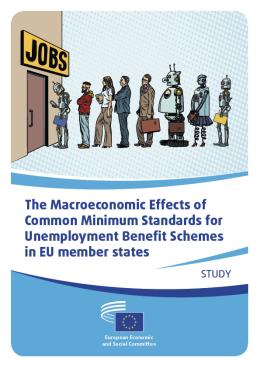European Economic
and Social Committee
Main navigation
-
Относно
ABOUT
The European Economic and Social Committee (EESC) is the voice of organised civil society in Europe.
Find out more about its role and structure at http://www.eesc.europa.eu/en/about
- Политическа организация
- Административна организация
- СЪТРУДНИЧЕСТВО С ДРУГИ ИНСТИТУЦИИ
- Rules
-
Нашата работа
OUR WORK
The EESC issues between 160 and 190 opinions and information reports a year.
It also organises several annual initiatives and events with a focus on civil society and citizens’ participation such as the Civil Society Prize, the Civil Society Days, the Your Europe, Your Say youth plenary and the ECI Day.
Find the latest EESC opinions and publications at http://www.eesc.europa.eu/en/our-work/opinions-information-reports/opinions and http://www.eesc.europa.eu/en/our-work/publications-other-work/publications respectively.
- Становища и информационни доклади
- Документи
- Публикации и други документи
-
Гражданско общество и участие на гражданите
- Civil Society Week
- European elections 2024
- Награда за гражданското общество
- The Conference on the Future of Europe
- Европейски паспорт за демокрация
- Твоята Европа, твоето мнение!
- Европейска гражданска инициатива (ЕГИ)
- The path to our industrial future
- Youth Climate and Sustainability Round Tables
- EU Organic Awards
- Civil Society Against COVID 19
- EESC stands with Ukraine
- Partnerships
- Relations with ESCs
-
Политики
POLICIES
The EESC is active in a wide range of areas, from social affairs to economy, energy and sustainability.
Learn more about our policy areas and policy highlights at http://www.eesc.europa.eu/en/policies
-
Област на политика
- Селско стопанство, развитие на селските райони и рибарство
- Действия в областта на климата
- Политика на сближаване, регионална и селищна политика
- Потребители
- Цифровизация и информационно общество
- Икономически и паричен съюз
- Образование и обучение
- Заетост
- Енергетика
- Предприятия
- Околна среда
- Външни отношения
- Финансови услуги и капиталови пазари
- Основни и граждански права
- Housing
- Промишленост и индустриални промени
- Институционални въпроси и бюджет на ЕС
- Миграция и убежище
- Научни изследвания и иновации
- Услуги от общ интерес
- Единен пазар
- Социални въпроси
- Устойчиво развитие
- Данъчно облагане
- Транспорт
-
Във фокуса
- Call to EU candidate countries civil society
- EESC stands with Ukraine
- The Conference on the Future of Europe
- Европейска платформа на заинтересованите страни в областта на кръговата икономика
- European Gender Equality Week
- COP 29
- Youth participation at the EESC
- EU Blue Deal
- Cost of living
- ConnectingEU
- EU Rural Pact
-
Област на политика
-
Дневен ред
AGENDA
The EESC holds nine plenary sessions per year. It also organises many conferences, public hearings and high-level debates related to its work.
Find out more about our upcoming events at http://www.eesc.europa.eu/en/agenda/our-events/upcoming-events
- Нашите прояви
-
Новини и медии
NEWS & MEDIA
Here you can find news and information about the EESC'swork, including its social media accounts, the EESC Info newsletter, photo galleries and videos.
Read the latest EESC news http://www.eesc.europa.eu/en/news-media/news and press releases http://www.eesc.europa.eu/en/news-media/press-releases
- President
-
Членове и групи
MEMBERS & GROUPS
The EESC brings together representatives from all areas of organised civil society, who give their independent advice on EU policies and legislation. The EESC's326 Members are organised into three groups: Employers, Workers and Various Interests.
Find out more about our Members and groups at http://www.eesc.europa.eu/en/members-groups
- Членове
- Групи
-
Секции и други органи
SECTIONS & OTHER BODIES
The EESC has six sections, specialising in concrete topics of relevance to the citizens of the European Union, ranging from social to economic affairs, energy, environment, external relations or the internal market.
Find out more at http://www.eesc.europa.eu/en/sections-other-bodies
-
Секции / комисия
- „Икономически и паричен съюз, икономическо и социално сближаване“ (ECO)
- „Единен пазар, производство и потребление“ (INT)
- „Транспорт, енергетика, инфраструктури, информационно общество“ (TEN)
- „Заетост, социални въпроси и гражданство“ (SOC)
- „Земеделие, развитие на селските райони, околна среда“ (NAT)
- „Външни отношения“ (REX)
- Консултативна комисия по индустриални промени (CCMI)
- Обсерватории
- Други
-
Секции / комисия
- Ukraine
sidebar submenu
Нашата работа
- Становища и информационни доклади
- Документи
- Публикации и други документи
-
Гражданско общество и участие на гражданите
- Civil Society Week
- European elections 2024
- Награда за гражданското общество
- The Conference on the Future of Europe
- Европейски паспорт за демокрация
- Твоята Европа, твоето мнение!
- Европейска гражданска инициатива (ЕГИ)
- The path to our industrial future
- Youth Climate and Sustainability Round Tables
- EU Organic Awards
- Civil Society Against COVID 19
- EESC stands with Ukraine
- Partnerships
- Relations with ESCs

